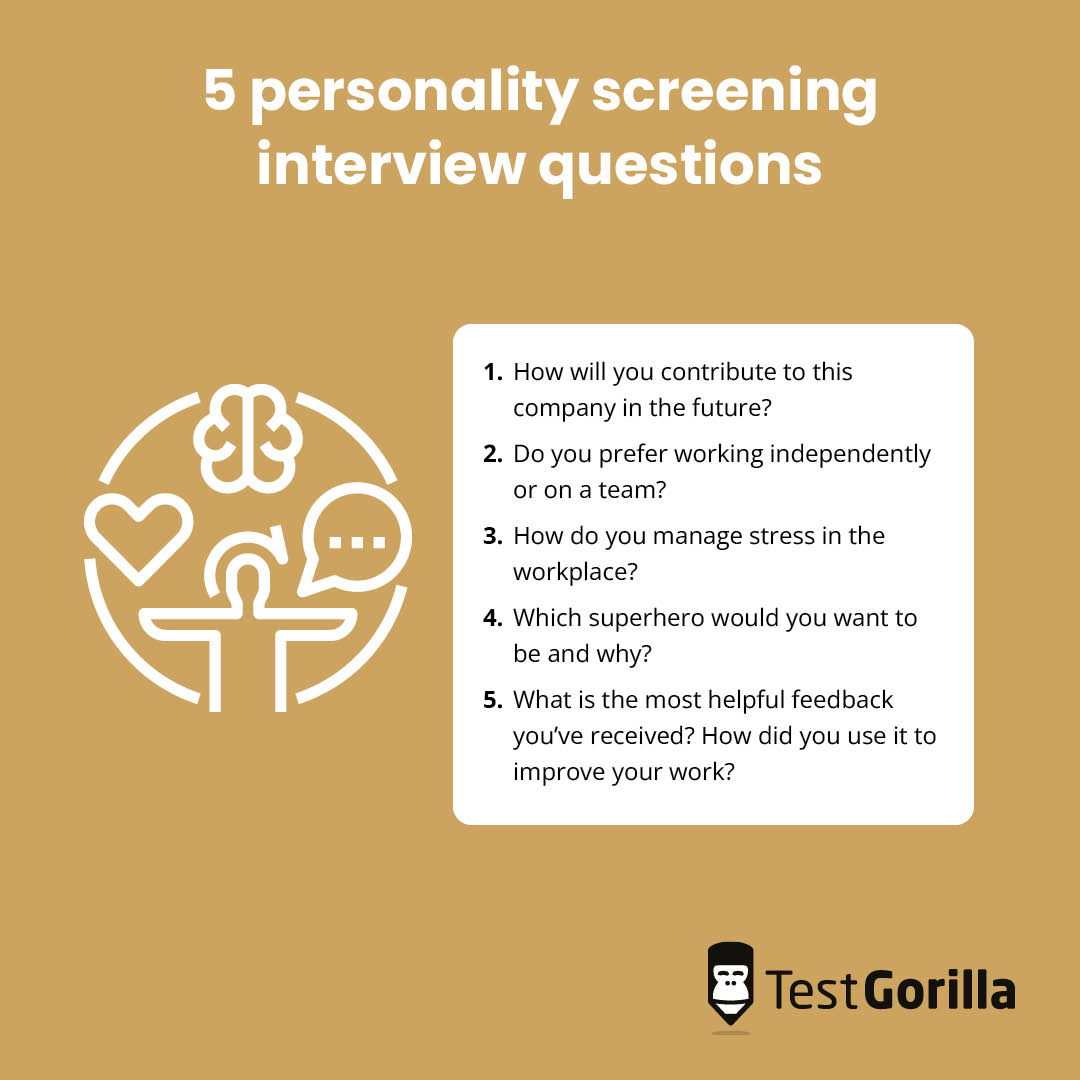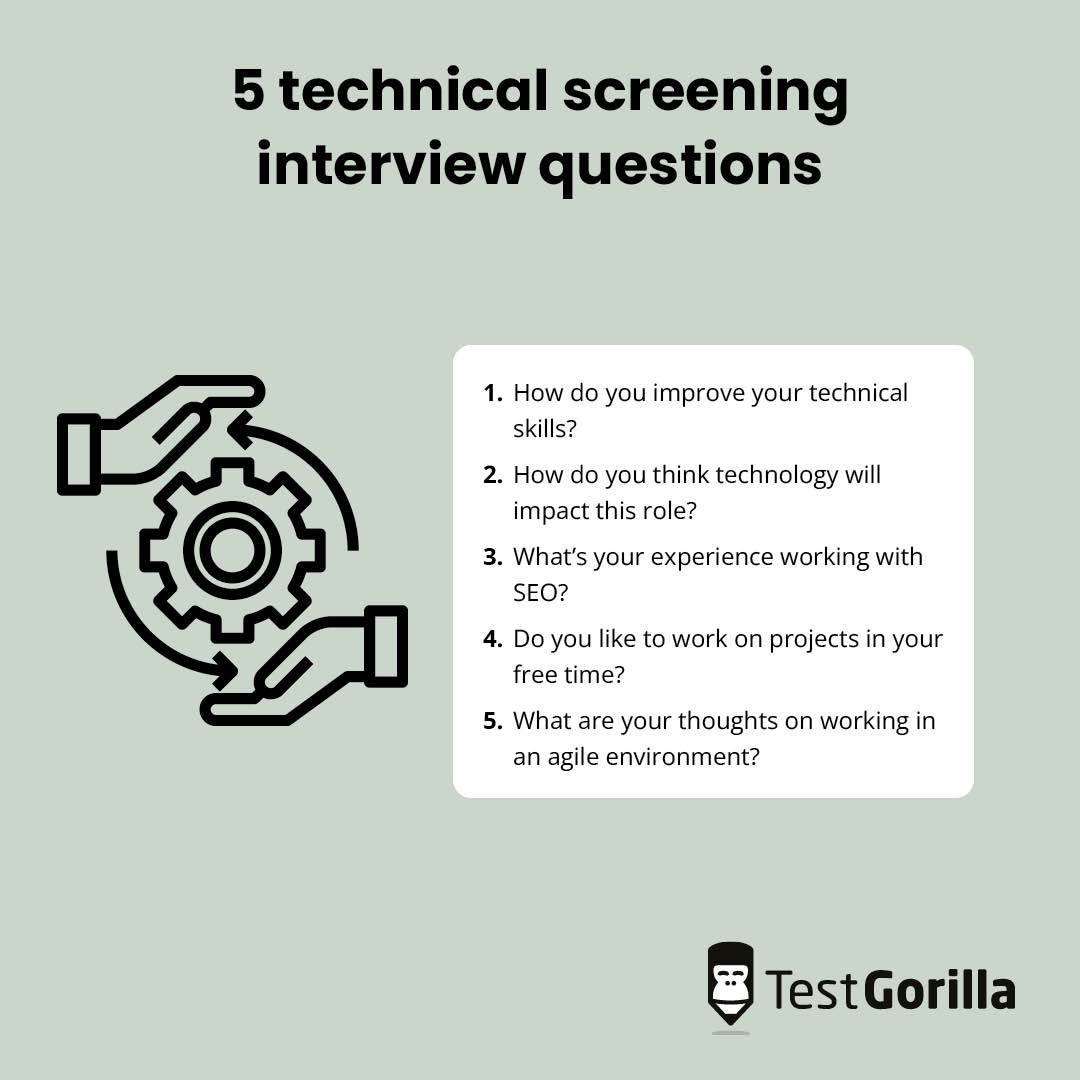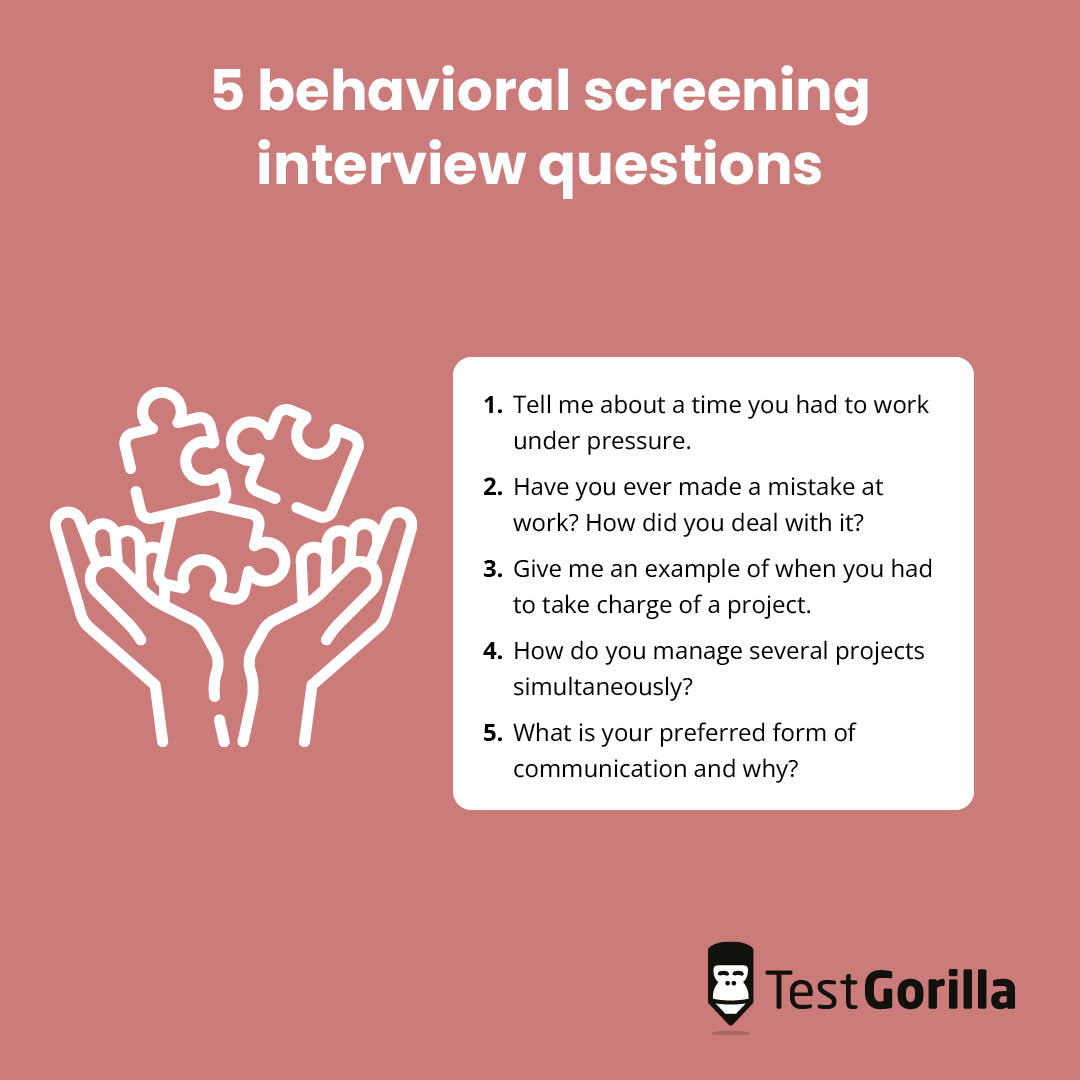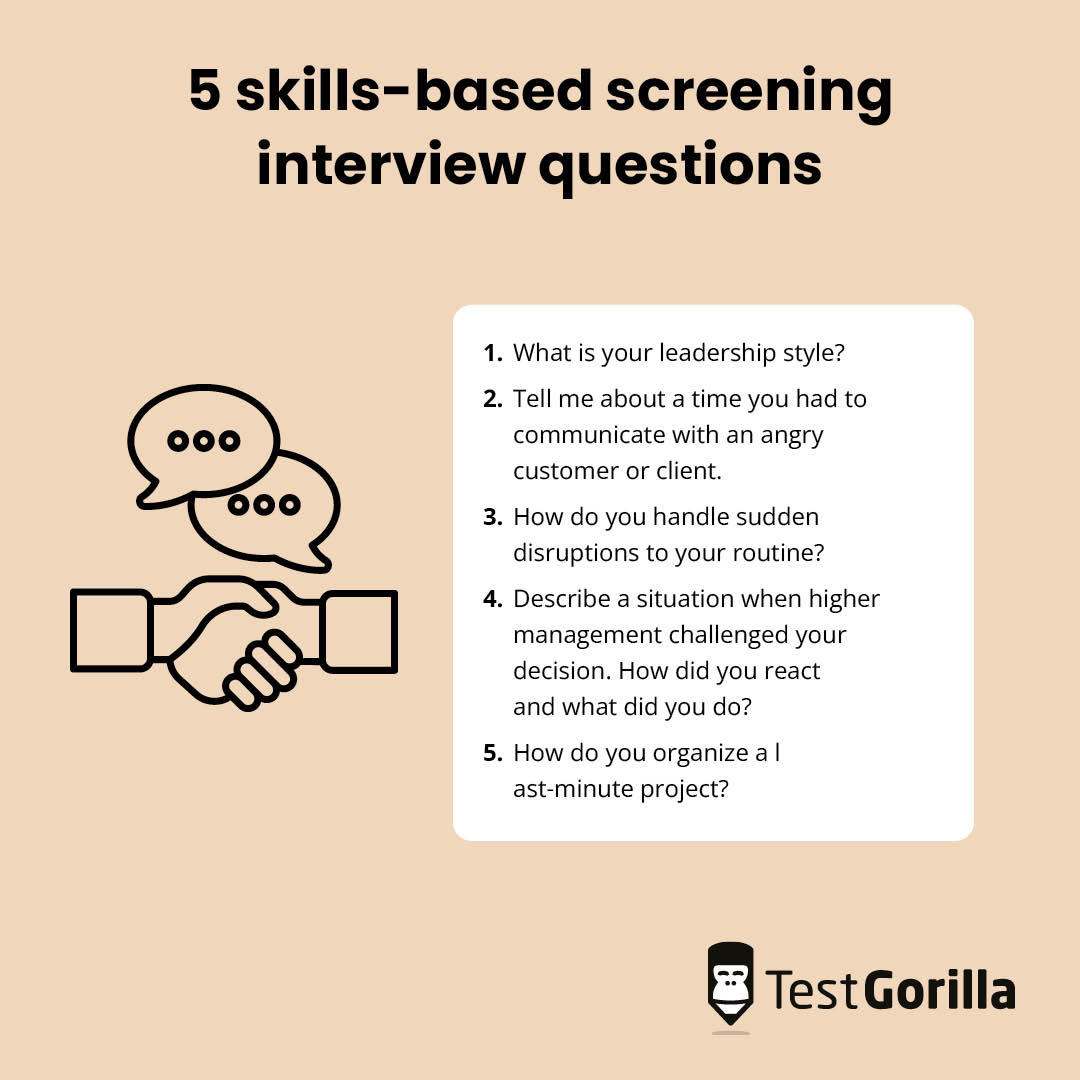To assess top talent, you need to evaluate their work experience, knowledge, and skills objectively. The best methods to do this include: conducting screening interviews with the right questions and sending candidates a skills assessment.
With assessments that feature Culture add tests, you can quickly evaluate the candidates’ work-related values and behaviors. You can then complete screening interviews to:
Explore your applicants’ unique personalities
Assess their values further
Determine if they are passionate about working for your company
Before using skills tests and screening interviews, it’s essential to find the right questions. Keep reading to discover our list of 50 screening interview questions, along with a selection of sample answers to evaluate your applicants’ responses.
Table of contents
- 10 personality screening interview questions
- 5 personality screening interview questions and answers
- 12 technical screening interview questions
- 5 technical screening interview questions and answers
- 15 behavioral screening interview questions
- 5 behavioral screening interview questions and answers
- 13 skills-based screening interview questions
- 5 skills-based screening interview questions and answers
- At which stage of the hiring process should you use screening interview questions?
- Hire top talent using our screening interview questions and skill assessments
10 personality screening interview questions
Ask applicants these personality screening interview questions to discover more about their unique beliefs and character traits.
What attracted you to this particular role or company?
How will you contribute to this company in the future?
Do you prefer working independently or on a team?
What are you most passionate about?
How do you manage stress in the workplace?
Can you tell me about one of your professional achievements?
Which superhero would you want to be and why?
Describe a time you had to adapt to sudden change.
What is one thing you would change about your personality?
What is the most helpful feedback you’ve received? How did you use it to improve your work?
5 personality screening interview questions and answers
Here are some popular screening questions and sample answers that can help you evaluate your candidates’ responses.
1. How will you contribute to this company in the future?
Candidates who don’t have goals, ideas, and aspirations related to their future contributions may not be suitable for the role. If they struggle to answer this question, it may indicate that they haven’t considered their future career prospects.
Does the candidate have a long-term plan? What are they hoping to achieve in your company? Consider asking the candidate follow-up questions to determine how they want to progress on their career path.
A common interview mistake is to only focus on skills and work experience rather than the candidate’s behaviors and mindset. Therefore, during the interview, try to find out whether they have the right motivation to make a positive impact on your company.
2. Do you prefer working independently or on a team?
The ideal candidate will be open to team projects and independent work. It’s normal to have preferences, but if a candidate doesn’t want to collaborate with others, their lack of communication may lead to poor team cohesion.
You can only build a high-performing team by hiring team-driven professionals who can also excel on their own. A team comprising applicants with these abilities may achieve outstanding results in projects.
It’s worth sending candidates a 16 Types Personality test before the screening interviews to better understand how they collaborate with team members, make decisions, drive positive results, and focus on productivity. Online screening assessments ensure you interview suitable candidates who can bring something unique to the table.
3. How do you manage stress in the workplace?
Research suggests that 57% of employees experience daily stress at work, which may derive from factors like tight deadlines or challenging clients. Candidates should have a plan to reduce emotional strain to protect their mental health and feel more productive in the workplace.
For example, one candidate might journal during their lunch break to express their thoughts, track daily stressors, and relieve stress. Other candidates may seek support from a manager when their tasks become demanding.
4. Which superhero would you want to be and why?
This question may seem random, but it’s a fun topic to add to the screening interview. The candidate should take the time to think of a unique response to distinguish themselves from other applicants.
Even if you don’t know who the superhero is, jot down their answer and consider which strengths, powers, and weaknesses they describe.
You could also use a Big 5 (OCEAN) personality test to evaluate their personality inclinations, including openness, conscientiousness, extroversion, agreeableness, and emotional stability. The results of this test are ideal for creating learning and development courses during the onboarding stage.
5. What is the most helpful feedback you’ve received? How did you use it to improve your work?
To better understand a candidate’s personality, you should ask them about their weaknesses and how they receive feedback. The ideal candidate will be honest about constructive criticism they’ve received in previous jobs, whether it’s to do with their communication skills or their ability to plan projects.
Candidates can use the STAR method by explaining the situation and task, describing their actions, and stating the final result. Listen for responses that indicate the candidate’s work improved after they received the feedback.
12 technical screening interview questions
Below are some technical screening interview questions you can use when hiring for tech-based roles in your company.
Which online resources do you use to help you complete your tasks?
How do you improve your technical skills?
What are your favorite and least favorite technological advancements?
How do you think technology will impact this role?
Can you name some of the latest technological trends that could benefit our company?
Which programming languages do you know?
Describe your product creation process.
What’s your experience working with SEO?
How would you describe a project plan?
Describe your quality control process.
Do you like to work on projects in your free time?
What are your thoughts on working in an agile environment?
5 technical screening interview questions and answers
Refer to these technical questions and sample answers after the screening interview to better understand the candidate’s knowledge and skills.
1. How do you improve your technical skills?
Candidates who seek self-improvement usually try to learn and develop new technical skills. They want to achieve personal development goals and technical abilities that enhance their productivity in the workplace.
A suitable candidate should give examples of how they improve their technical skills outside of work, which may prove they have more dedication to progress.
A study by McKinsey & Company found that 87% of companies believe they currently have a skills gap or will expect one in a few years. Not hiring candidates with the right technical skills may lead to workplace inefficiency.
To hire candidates with sufficient technical skills, you could send candidates basic technical assessments — like our Google Sheets or Microsoft Excel skills tests — to determine their level of expertise. These tests also evaluate the ability to structure information using technical features in software programs.
2.How do you think technology will impact this role?
Candidates who apply for technical roles should stay up to date with technological advancements and how they impact their industry. They might research the latest trends online or ask professionals about recent software developments.
If candidates lack an interest in technology, they may not have applicable skills and knowledge. Make a note of each response to ensure you choose a candidate who is enthusiastic about new developments.
3. What’s your experience working with SEO?
Only some candidates will have experience with SEO, but most should still understand what it means if they’ve researched this term. Optimizing content is a great way to maintain a reputable brand image and push valuable information to customers.
The ideal candidate will provide examples of successful SEO techniques or explain how they would help your company become more visible via online channels.
Send each candidate a Technical SEO test to see how they:
Analyze websites
Improve their content in search engines
Manage basic Google tools
This test is ideal for hiring technical SEO experts who can keep your content ahead of the competition.
4. Do you like to work on projects in your free time?
Answers to this question will show whether candidates use their free time to improve their technical skills. Self-improvement in the workplace is necessary, but working on independent projects or taking the time to research new trends proves the candidate is passionate about technology.
Consider asking extra questions about their projects to learn what they enjoy doing outside of a work environment and the skills they’ve honed. For example, you may ask a software developer if they create applications in their free time.
5. What are your thoughts on working in an agile environment?
An agile recruitment strategy or environment offers workers many advantages because it:
Promotes change
Creates innovation
Enhances process improvement
Your company may use the agile approach to deliver content to customers or clients with minimal problems. Candidates who understand this type of environment usually seek constant self-improvement when collaborating with team members and other departments.
15 behavioral screening interview questions
Ask applicants some of these 15 behavioral screening interview questions to understand their behavior, mindset, and morals in a professional context.
Tell me about a time you had to work under pressure.
How do you approach a new challenge?
Name three improvements you made in your previous job.
What do you do if a team member disagrees with your idea?
Have you ever made a mistake at work? How did you handle it?
What has been your biggest regret in the workplace?
Give me an example of when you had to lead a project.
Have you ever had to set goals for the entire team?
Talk me through your process of creating personal goals.
How do you manage several projects at once?
Tell me about a time you had to resolve a conflict at work. How did you do it?
How do you handle unexpected changes to projects?
What is your preferred form of communication and why?
Describe a time you had to make a good first impression on a client.
What makes an ideal colleague in your eyes?
5 behavioral screening interview questions and answers
Check out these behavioral questions and sample answers when comparing responses after each screening interview.
1. Tell me about a time you had to work under pressure.
Candidates should be able to work under pressure and find coping strategies to handle stressful situations. It’s believed that 55% of employees feel stressed daily because of their workloads. This stress can lead to lower productivity levels and poor mental health, which prevents team members from working together efficiently.
The ideal candidate will give an example of a time they had to work under pressure and how they have dealt with it in the past. If they use the STAR method in their answer, their responses will be well-structured and show they have prepared for the interview.
2. Have you ever made a mistake at work? How did you deal with it?
Everyone makes mistakes in a job, but how they deal with them is essential. The candidate should talk about a mistake that bothered them and what they did to resolve it.
This question enables you to better understand your candidates’ thought processes and mindset when it comes to self-improvement.
3. Give me an example of when you had to take charge of a project.
Candidates should know the various leadership styles and how they affect project management if they want to become a leader in the future. For example, one candidate may prefer a coaching style when managing projects and teams because it nurtures their employees’ strengths. Other candidates may focus on a visionary mindset due to an inclination toward innovative thinking.
Note their preferred styles to determine whether they’ll be strong leaders in your company.
It’s also worth using the Leadership & People Management test to evaluate their current leadership skills. This test covers delegation authority, timely guidance, and development strategies that show how the potential leader will support other team members.
4. How do you manage several projects simultaneously?
Hiring candidates with time-management skills means they are more likely to complete tasks on time and satisfy demanding requirements of the job. The candidate should explain how they organize several projects to prevent missed deadlines or unhappy clients. Time-management skills help all team members have a better work-life balance and reduce stress levels.
Research suggests that 88% of employees procrastinate daily with 17% of those wasting up to four hours on pointless tasks. To lower this percentage in your company, you must find candidates who can organize and plan projects wisely.
Use a Time Management skills test to evaluate the candidates’ ability to prioritize, plan, and execute important projects. Candidates can also show their reflection and communication skills when organizing plans in a professional environment.
5. What is your preferred form of communication and why?
Candidates who know the four communication types usually have more experience with thoughtful interaction and active listening. They should give examples of their preferred communication style and how it benefits them in the workplace.
For instance, some candidates may enjoy digital messaging for its convenience, while others find verbal conversations to be the most effective form of communication.
A Communication skills test will assess how candidates use written and verbal communication at work. With data-driven results, you can hire candidates who know how to discuss problems and interact with other team members.
13 skills-based screening interview questions
Use these skills-based screening interview questions to identify candidates with high-quality skills and knowledge.
How do you organize a last-minute project?
What is your leadership style?
Tell me about a time you had to communicate with an angry customer or client.
How would you use communication to lead a presentation?
What does good customer service mean to you?
Have you ever had to delegate tasks to your team members?
How do you handle sudden disruptions to your routine?
Give me an example of when you had to work on a project independently.
How would you actively listen to a colleague if they had a problem?
Talk me through the steps of planning your schedule at work.
How do you gain technical knowledge and experience?
Describe a situation when higher management challenged your decision. How did you react and what did you do?
How would you deal with a disagreement among your team members?
5 skills-based screening interview questions and answers
After each screening interview, refer to these skills-based questions and sample answers to compare the responses from every candidate.
1. What is your leadership style?
Hiring potential leaders can be a challenging task for many recruiters. According to a Gallup study, 82% of companies fail to hire the right candidate with suitable talent. This hiring mistake can lead to increased turnover rates and poor productivity among team members. Therefore, it’s important to learn about each candidate’s leadership style and level of expertise when hiring.
Make sure the candidate clearly defines their unique leadership style and how they would use it to guide team members and enforce a positive work culture.
2. Tell me about a time you had to communicate with an angry customer or client.
Not every customer will be entirely satisfied with your services or products — it’s inevitable that some may be unhappy. However, candidates should know how to de-escalate these situations to prevent further negative responses.
They may use communication and problem-solving skills to resolve disagreements, whether by discussing the issue over a meeting or negotiating solutions so the customers and team members are satisfied. Promising candidates will provide examples of how they’ve handled confrontations in the past and talk you through each step of their process.
Consider sending candidates a Problem solving test before the screening interview to see how they respond to complex situations and whether they use logic to make decisions.
3. How do you handle sudden disruptions to your routine?
Candidates who can adapt to changes quickly may show more determination. For instance, they may learn new skills on the same day or train others to use the latest software.
Employees responsible for demanding duties usually encounter changes to their routines or sudden developments that alter the company’s processes. An ideal candidate will discuss how they adapt to the workplace and provide examples of real changes in previous jobs.
4. Describe a situation when higher management challenged your decision. How did you react and what did you do?
This question focuses on a candidate’s decision-making skills and how they stand by their ideas in the workplace. Disagreements are normal, but candidates should defend their own beliefs and explain why specific ideas are effective. They might also mention how negotiation is essential to resolving a conflict with higher management.
You can use a Negotiation skills test to evaluate the candidate’s ability to drive business discussions and influence decisions in the company. The candidate can also prove how they achieve positive results by using emotional intelligence.
5. How do you organize a last-minute project?
Candidates with strong organizational skills are more likely to meet deadlines and complete tasks on time. They know exactly how to plan projects and organize last-minute tasks to satisfy client needs.
Each candidate should discuss previous work experience or training courses that allowed them to stay on top of tasks or manage projects efficiently. Hiring a candidate with these project management skills can instantly boost productivity levels in your company.
Research proves 88% of employees still want to improve their time management and organizational skills. For example, they might want to use database software to document tasks or create online to-do lists throughout the day. This research shows how important it is to hire candidates with high-quality skills and relevant work experience.
At which stage of the hiring process should you use screening interview questions?
We recommended using these screening interview questions after the skills assessment. Inviting applicants to complete skills tests first saves time and ensures you only interview candidates with relevant skills, work experience, knowledge, and character traits.
Using skills testing can help you identify top talent among a group of candidates. There are specific tests that evaluate each candidate’s ability to implement their skills in the workplace.
For example, you may use a Customer Service test when hiring a store assistant, and roles in HR could require a specialized test, such as our HR Fundamentals test. You should select tests that apply to your open position and hiring strategies.
Once you’ve created a shortlist of candidates who proved their skills in the tests, you can proceed with screening interviews to better understand their personalities.
Hire top talent using our screening interview questions and skill assessments
Before conducting screening interviews, you can search TestGorilla’s comprehensive test library to find relevant assessments. The drop-down menu provides cognitive ability, language, personality and culture, programming, situational judgment, software, and role-specific tests. Most assessments are only 10–30 minutes long and can help you identify the best talent for your open position.
Once you’ve evaluated the results from each test, it’s time to start your screening interviews. Use our list of screening interview questions to assess applicants, create a shortlist of candidates, and fill the role with someone who holds extensive knowledge, skills, and unique character traits.
Related posts
Hire the best candidates with TestGorilla
Create pre-employment assessments in minutes to screen candidates, save time, and hire the best talent.
Latest posts
The best advice in pre-employment testing, in your inbox.
No spam. Unsubscribe at any time.

Hire the best. No bias. No stress.
Our screening tests identify the best candidates and make your hiring decisions faster, easier, and bias-free.
Free resources
This checklist covers key features you should look for when choosing a skills testing platform
This resource will help you develop an onboarding checklist for new hires.
How to assess your candidates' attention to detail.
Learn how to get human resources certified through HRCI or SHRM.
Learn how you can improve the level of talent at your company.
Learn how CapitalT reduced hiring bias with online skills assessments.
Learn how to make the resume process more efficient and more effective.
Improve your hiring strategy with these 7 critical recruitment metrics.
Learn how Sukhi decreased time spent reviewing resumes by 83%!
Hire more efficiently with these hacks that 99% of recruiters aren't using.
Make a business case for diversity and inclusion initiatives with this data.





















